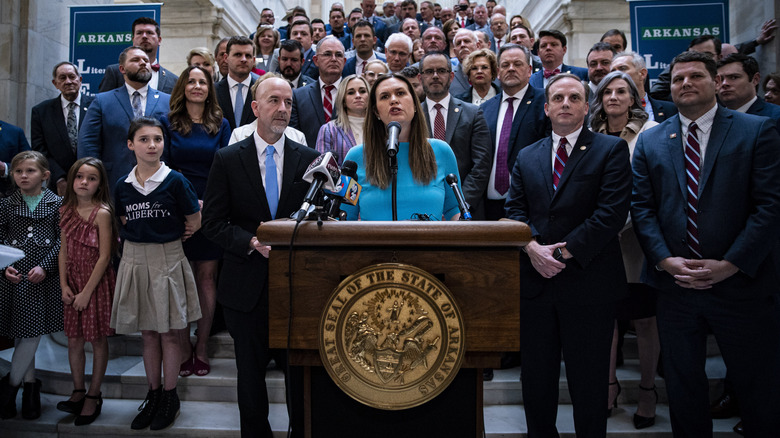New Arkansas Labor Law Makes It Easier For Restaurants To Hire Children
The phrase "child labor" may bring up frightening images of exploited children forced to work against their will, so it's a good thing that each state has laws in place that strictly regulate the employment of minors. In one recent example of child labor laws doing what they were meant to do, a California Popeyes was shut down when it was allegations surfaced that workers had been forced to work long hours on school nights. Other employers, including Dunkin' and Crumbl Cookies, have also been fined for child labor violations. In Arkansas, however, certain regulations were seen as creating red tape and hassle for young people who wanted to enter the workforce. Arkansas' governor, Sara Huckabee Sanders, recently addressed this issue by signing off on the Youth Hiring Act of 2023 that amends existing labor regulations
Prior to this law going into effect, any employment seeker under the age of 16 had to seek permission from Arkansas' Department of Labor. The state also needed to verify the age of every potential job applicant to make sure that they were at least 14 (those under this age are not permitted to be employed in Arkansas except under certain circumstances). While Sanders' spokesperson told NPR that the old laws were an "arbitrary burden on parents," it's possible that House Bill 1410 might be even more pro-business than it is family-friendly. In all likelihood, this new law should help restaurants (among other employers) fill vacancies in jobs that older workers won't take.
Not everyone approves of the new law, though
The new law doesn't abolish most of Arkansas' child labor regulations. It's still forbidden for teens to work in establishments that sell alcohol as well as in hazardous occupations. Under-16s still cannot work more than 6 days or 48 hours a week and are not allowed to work later than 9 p.m. on weekends and 7 p.m. on school nights. What's more, anyone under 14 can only work in a family business, delivering newspapers, or in the entertainment industry, and these jobs must not interfere with their education. So this isn't a green light to let 14-year-olds work overnight at fast food joints.
Even with these existing protections still in place, the Arkansas Advocates for Children and Families sees the new law as problematic since it could make it more likely for younger workers to slip through the cracks when violations occur. The organization feels that an important component of the old law was the requirement that businesses provide evidence in writing that they knew the workers they hired were underage and thus subject to the full protections accorded by Arkansas' child labor regulations. Whether the gesture served as an effective deterrent to exploitation may have varied from business to business, but the paper trail established could have helped build a case for prosecution in the event that any laws were violated. Now that this safety measure has been eliminated, the AACF is concerned that businesses may take advantage of the fact.

